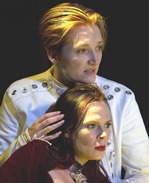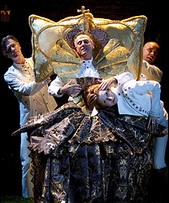SITE GUIDE
SEARCH
REVIEWS
REVIEW ARCHIVES
ADVERTISING AT CURTAINUP
FEATURES
NEWS
Etcetera and
Short Term Listings
LISTINGS
Broadway
Off-Broadway
NYC Restaurants
BOOKS and CDs
OTHER PLACES
Berkshires
London
California
New Jersey
DC
Connecticut
Philadelphia
Elsewhere
QUOTES
TKTS
PLAYWRIGHTS' ALBUMS
LETTERS TO EDITOR
FILM
LINKS
MISCELLANEOUS
Free Updates
Masthead
A CurtainUp Review
Orlando
|
She was a man, she was a woman—She knew the screts and shared the weaknesses of each.— Orlando, as the lady metamorphosing from 200 years of living as a young man.
|

Francesca Faridany (top) and Annika Boras
(Photo: Joan Marcus) |
Allen Moyer's spare but stunning scenic design actually includes a mirror, this one a gigantic affair tilted above the stage. Except for that one huge prop, Moyer's design, abetted by Christian Frederickson and Ryan Rumery's evocative soundscape, moves the story through history without elaborately detailed scenery. I can't recall seeing a white cloth used quite so magically to transform a grassy British landscape into a great frosty surface into a devastating thaw.
Ruhl's adaptation marries her love of language imbued with poetry to Woolf's ground-breaking amalgam of novel, poetry and theatrical fantasia. Annie-B Parson's understated choreography is an additional enhancement.
Francesca Faridany is an endearing ever-questioning, ever evolving Orlando. The ensemble, right before our eyes, shifts from being the narrating chorus to portraying the people in Orlando's multi-generational, gender shifting saga,
Ruhl's adaptation, as staged by Rebecca Taichman, is easily accessible and stands on its own. However, spending two hours with this ravishing stage version may well make you visit (or re-visit) the novel to savor its poetry, stylistic originality and witty observations on life and love through the centuries and the similarities between the sexes. A look at the book will further you appreciation of the way this page to stage transition honors the original author's intent and reinforces her search for new character and development and story telling techniques. (It's available for free download at Project Gutenberg-- http://gutenberg.net.au/ebooks02/0200331.txt)
As explained in the extensive and informative program notes the idea of century travelling male-female Orlando was inspired by Woolf's love for the flamboyant Vita Sackville-West who, like Orlando, was a writer who worshipped the idea of great literary reputation while finding only fame. The poem "The Oak Tree" with which Orlando struggles throughout his/her journey refers to the poem "The Land" for which Sackville-West won the Hawthornden Prize in 1926.
To explore all the aspects of Sackville-West's personality, Woolf had Orlando spend 200 years as an English nobleman, a favorite of Queen Elizabeth's. He falls in love with Sasha, a Russian Princess who betrays him, flees an Archduchess and falls asleep one day to awaken as a woman. In a dreamlike reality, this female Orlando now moves forward through the next several centuries— all the while seeking and finding answers to what it means to live fully in the present, in our own skin, in our own gender, and in our own time.
While the title character matures and changes gender, Faridany unlike the Chorus, sticks to this role throughout; so does Annika Boras as the conquettish Sasha who is Orlando's first great love. (The Orlando-Sacha romance in Woolf's novel referred not to herself and Vita Sackville-West but to Vita and Violet Trefusius).

Tom Nelis, David Greenspan (Queen Elizabeth), Francesca Faridany and Howard Overshown
(Photo: Joan Marcus) |
No review of this vibrant production would be complete without a big shoutout for Anita Yavich's costumes. She's created tailored white suits as a sort of basic uniform for Orlando and the Chorus. She cleverly uses a paper doll type clip-on costume to transform Greenspan into The Queen. Yavich is at her most wizardly during Orlando's journey into the Victorian era in a gown symbolically encumbered by a humongous train and a series of rings encircling her body to focus on the wedding ring finger and thus the restrictions imposed, not just by being a woman, but being a woman in a social era that has couples stuck together all around her and demands that she marry.
Though this story has been dramatized in a 1992 film starring Tilda Swinton and as a ballet by Marco Goecke, this inventive and lively adaption is unique and well worth seeing.
As you can see from the links to plays by Sarah Ruhl reviewed at Curtainup, this fully emerged emerging young playwright is widely produced whether delving into the past or contemporary life
The Clean House (Los Angeles )
The Clean House (New York)
The Clean House/ ( DC)
The Clean House ( Philadelphia)
Dead Man's Cell Phone/(New York)
Eurydice(London)
Eurydice (New York)
Eurydice (Philadelphia)
In the Next Room or the vibrator play(New York)
Passion Play(New York )
Passion Play: A Cycle in Three Parts (Chicago)
Passion Play (DC)
|
Orlando Sara Ruhl adaptation of Virginia Woolf's novel of same name Directed by Rebecca Taichman Cas:t Annika Boras (Sasha), Francesca Faridany (Orlando), David Greenspan, Tom Nelis and Howard Overshown (Chorus). Choreography by Annie-B Parson Set design by Allen Moyer Costumes by Anita Yavich Lighting by Christopher Akerlind Original Music & Sound Design by Christian Frederickson & Ryan Rumery Stage Manager: Erin Maureen Koster Running Timer: 2 hours including one intermission Classic Stage Company, 136 East 13th Street www.classicstage.org From 9/09/10; opening 9/23/10; closing 10/17/10 Tuesdays through Fridays at 8pm; Saturdays at 2pm and 8pm and Sundays at 2pm. Tickets are $60 for weekday performances and $65 for weekends Reviewed by Elyse Sommer at 9/20 press matinee |
|
REVIEW FEEDBACK Highlight one of the responses below and click "copy" or"CTRL+C"
Paste the highlighted text into the subject line (CTRL+ V): Feel free to add detailed comments in the body of the email. . .also the names and emails of any friends to whom you'd like us to forward a copy of this review. Visit Curtainup's Blog Annex For a feed to reviews and features as they are posted add http://curtainupnewlinks.blogspot.com to your reader Curtainup at Facebook . . . Curtainup at Twitter Subscribe to our FREE email updates: E-mail: esommer@curtainup.comesommer@curtainup.com put SUBSCRIBE CURTAINUP EMAIL UPDATE in the subject line and your full name and email address in the body of the message |
|
Subscribe to our FREE email updates with a note from editor Elyse Sommer about additions to the website -- with main page hot links to the latest features posted at our numerous locations. To subscribe,
E-mail: esommer@curtainup.comesommer@curtainup.com
put SUBSCRIBE CURTAINUP EMAIL UPDATE in the subject line and your full name and email address in the body of the message -- if you can spare a minute, tell us how you came to CurtainUp and from what part of the country. |



